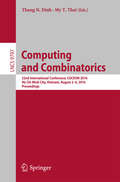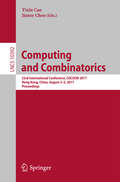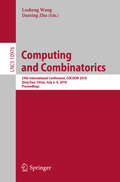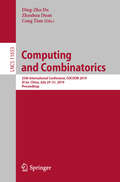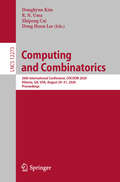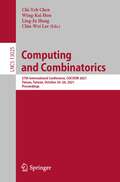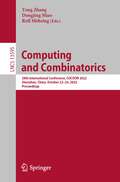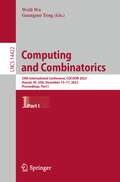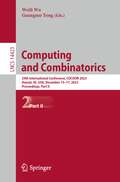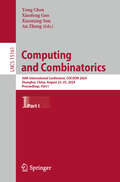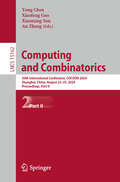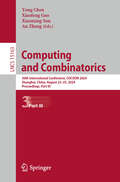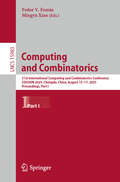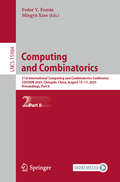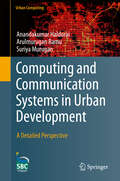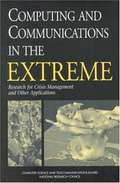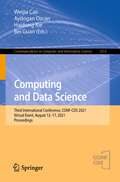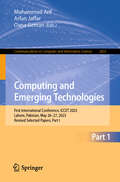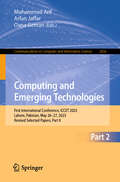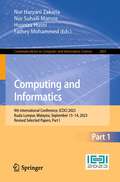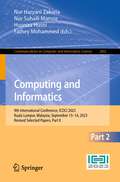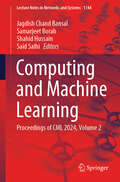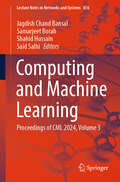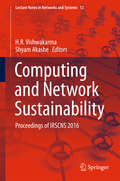- Table View
- List View
Computing and Combinatorics: 22nd International Conference, COCOON 2016, Ho Chi Minh City, Vietnam, August 2-4, 2016, Proceedings (Lecture Notes in Computer Science #9797)
by My T. Thai Thang N. DinhConstitutes the proceedings of the 16th Annual International Conference on Computing and Combinatorics, held in Nha Trang, Vietnam, in July 2010.
Computing and Combinatorics: 23rd International Conference, COCOON 2017, Hong Kong, China, August 3-5, 2017, Proceedings (Lecture Notes in Computer Science #10392)
by Yixin Cao and Jianer ChenThis book constitutes the refereed proceedings of the 23rd International Conference on Computing and Combinatorics, COCOON 2017, held in Hiong Kong, China, in August 2017. The 56 full papers papers presented in this book were carefully reviewed and selected from 119 submissions. The papers cover various topics, including algorithms and data structures, complexity theory and computability, algorithmic game theory, computational learning theory, cryptography, computationalbiology, computational geometry and number theory, graph theory, and parallel and distributed computing.
Computing and Combinatorics: 24th International Conference, COCOON 2018, Qing Dao, China, July 2-4, 2018, Proceedings (Lecture Notes in Computer Science #10976)
by Lusheng Wang Daming ZhuThis book constitutes the proceedings of the 24th International Conference on Computing and Combinatorics, COCOON 2018, held in Qing Dao, China, in July 2018. The 62 papers presented in this volume were carefully reviewed and selected from 120 submissions. They deal with the areas of algorithms, theory of computation, computational complexity, and combinatorics related to computing.
Computing and Combinatorics: 25th International Conference, COCOON 2019, Xi'an, China, July 29–31, 2019, Proceedings (Lecture Notes in Computer Science #11653)
by Ding-Zhu Du Zhenhua Duan Cong TianThis book constitutes the proceedings of the 25th International Conference on Computing and Combinatorics, COCOON 2019, held in Xi’an, China, in July 2019. The 55 papers presented in this volume were carefully reviewed and selected from 124 submissions. The papers cover various topics, including algorithm design, approximation algorithm, graph theory, complexity theory, problem solving, optimization, computational biology, computational learning, communication network, logic, and game theory.
Computing and Combinatorics: 26th International Conference, COCOON 2020, Atlanta, GA, USA, August 29–31, 2020, Proceedings (Lecture Notes in Computer Science #12273)
by Donghyun Kim Zhipeng Cai R. N. Uma Dong Hoon LeeThis book constitutes the proceedings of the 26th International Conference on Computing and Combinatorics, COCOON 2020, held in Atlanta, GA, USA, in August 2020. Due to the COVID-19 pandemic COCOON 2020 was organized as a fully online conference. The 54 papers presented in this volume were carefully reviewed and selected from 126 submissions. The papers cover various topics, including algorithm design, approximation algorithm, graph theory, complexity theory, problem solving, optimization, computational biology, computational learning, communication network, logic, and game theory.
Computing and Combinatorics: 27th International Conference, COCOON 2021, Tainan, Taiwan, October 24–26, 2021, Proceedings (Lecture Notes in Computer Science #13025)
by Chi-Yeh Chen Wing-Kai Hon Ling-Ju Hung Chia-Wei LeeThis book constitutes the proceedings of the 27th International Conference on Computing and Combinatorics, COCOON 2021, held in Tainan, Taiwan, in October 2021. Due to the COVID-19 pandemic, COCOON 2021 was organized as a hybrid conference. The 56 papers presented in this volume were carefully reviewed and selected from 131 submissions. The papers are divided into the following topical sub-headings: algorithms, approximation algorithms, automata, computational geometry, fault tolerant computing and fault diagnosis, graph algorithms, graph theory and applications, network and algorithms, online algorithm and stream algorithms, parameterized complexity and algorithms, and recreational games.
Computing and Combinatorics: 28th International Conference, COCOON 2022, Shenzhen, China, October 22–24, 2022, Proceedings (Lecture Notes in Computer Science #13595)
by Yong Zhang Rolf Möhring Dongjing MiaoThis book constitutes the proceedings of the 28th International Conference on Computing and Combinatorics, COCOON 2022, held in Shenzhen, China, in October 2022.The 39 full papers together with 12 short papers presented in this volume were carefully reviewed and selected from 101 submissions. The papers focus on subjects such as Algorithmica, Theoretical Computer Science, Journal of Combinatorial Optimization and others.
Computing and Combinatorics: 29th International Conference, COCOON 2023, Hawaii, HI, USA, December 15–17, 2023, Proceedings, Part I (Lecture Notes in Computer Science #14422)
by Weili Wu Guangmo TongThis two volume set LNCS 14422-14423 constitutes the refereed proceedings of the 29th International Conference, COCOON 2023, held in Hawaii, HI, USA, during December 2023. The 60 full papers were carefully reviewed and selected from 146 submissions. They are organized in the following topical sections:Part I : Combinatorics and Algorithms; Algorithmic Solution in Applications; and Algorithm in Networks.Part II: Complexity and Approximation; Graph Algorithms; and Applied Algorithms.
Computing and Combinatorics: 29th International Conference, COCOON 2023, Hawaii, HI, USA, December 15–17, 2023, Proceedings, Part II (Lecture Notes in Computer Science #14423)
by Weili Wu Guangmo TongThis two volume set volume LNCS 14422-14423 constitutes the refereed proceedings of the 29th International Conference, COCOON 2023, held in Hawaii, HI, USA, during December 2023. The 60 full papers were carefully reviewed and selected from 146 submissions. They are organized in the following topical sections:Part I : Combinatorics and Algorithms; Algorithmic Solution in Applications; and Algorithm in Networks.Part II: Complexity and Approximation; Graph Algorithms; and Applied Algorithms.
Computing and Combinatorics: 30th International Conference, COCOON 2024, Shanghai, China, August 23–25, 2024, Proceedings, Part I (Lecture Notes in Computer Science #15161)
by Yong Chen Xiaofeng Gao Xiaoming Sun An ZhangThis three-volume set LNCS 15161, 15162 and 15163 constitutes the refereed proceedings of the 30th International Conference, COCOON 2024, held in Shanghai, China, during August 23–25, 2024. The 90 full papers and 6 short papers were carefully reviewed and selected from 277 submissions. COCOON 2024 provided an excellent venue for researchers working in the area of algorithms, theory of computation, computational complexity, and combinatorics related to computing.
Computing and Combinatorics: 30th International Conference, COCOON 2024, Shanghai, China, August 23–25, 2024, Proceedings, Part II (Lecture Notes in Computer Science #15162)
by Yong Chen Xiaofeng Gao Xiaoming Sun An ZhangThis three-volume set LNCS 15161, 15162 and 15163 constitutes the refereed proceedings of the 30th International Conference, COCOON 2024, held in Shanghai, China, during August 23–25, 2024. The 90 full papers and 6 short papers were carefully reviewed and selected from 277 submissions. COCOON 2024 provided an excellent venue for researchers working in the area of algorithms, theory of computation, computational complexity, and combinatorics related to computing.
Computing and Combinatorics: 30th International Conference, COCOON 2024, Shanghai, China, August 23–25, 2024, Proceedings, Part III (Lecture Notes in Computer Science #15163)
by Yong Chen Xiaofeng Gao Xiaoming Sun An ZhangThis three-volume set LNCS 15161, 15162 and 15163 constitutes the refereed proceedings of the 30th International Conference, COCOON 2024, held in Shanghai, China, during August 23–25, 2024. The 90 full papers and 6 short papers were carefully reviewed and selected from 277 submissions. COCOON 2024 provided an excellent venue for researchers working in the area of algorithms, theory of computation, computational complexity, and combinatorics related to computing.
Computing and Combinatorics: 31st International Computing and Combinatorics Conference, COCOON 2025, Chengdu, China, August 15–17, 2025, Proceedings, Part I (Lecture Notes in Computer Science #15983)
by Mingyu Xiao Fedor V. FominThis two-volume set, LNCS 15983 and 15984, constitutes the referred proceedings of the 31st International Computing and Combinatorics Conference, COCOON 2025, held in Chengdu, China, during August 15–17, 2025. The 54 full papers were carefully reviewed and selected from 191 submissions. COCOON 2025 provided an excellent venue for researchers working in the topical sections as follows:Part I: Approximation Algorithms, Combinatorial Optimization, Computational Complexity, Computational Geometry, Economics and Computation.Part II: Graph Algorithms and Graph Theory, Learning and Data-Related Theory, Parameterized Algorithms, String Algorithms and Discrete Structures.
Computing and Combinatorics: 31st International Computing and Combinatorics Conference, COCOON 2025, Chengdu, China, August 15–17, 2025, Proceedings, Part II (Lecture Notes in Computer Science #15984)
by Mingyu Xiao Fedor V. FominThis two-volume set, LNCS 15983 and 15984, constitutes the referred proceedings of the 31st International Computing and Combinatorics Conference, COCOON 2025, held in Chengdu, China, during August 15–17, 2025. The 54 full papers were carefully reviewed and selected from 191 submissions. COCOON 2025 provided an excellent venue for researchers working in the topical sections as follows:Part I: Approximation Algorithms, Combinatorial Optimization, Computational Complexity, Computational Geometry, Economics and Computation.Part II: Graph Algorithms and Graph Theory, Learning and Data-Related Theory, Parameterized Algorithms, String Algorithms and Discrete Structures.
Computing and Communication Systems in Urban Development: A Detailed Perspective (Urban Computing)
by Anandakumar Haldorai Arulmurugan Ramu Suriya MuruganThis book presents the most recent challenges and developments in sustainable computing systems with the objective of promoting awareness and best practices for the real world. It aims to present new directions for further research and technology improvements in this important area.
Computing and Communications in the Extreme: Research for Crisis Management and Other Applications
by Communications Steering Committee Workshop Series on High Performance ComputingThis book synthesizes the findings of three workshops on research issues in high-performance computing and communications (HPCC). It focuses on the role that computing and communications can play in supporting federal, state, and local emergency management officials who deal with natural and man-made hazards (e.g., toxic spills, terrorist bombings). The volume also identifies specific research challenges for HPCC in meeting unmet technology needs in crisis management and other nationally important application areas, such as manufacturing, health care, digital libraries, and electronic commerce and banking.
Computing and Data Science: Third International Conference, CONF-CDS 2021, Virtual Event, August 12-17, 2021, Proceedings (Communications in Computer and Information Science #1513)
by Weijia Cao Aydogan Ozcan Haidong Xie Bei GuanThis volume constitutes selected papers presented at the Third International Conference on Computing and Data Science, CONF-CDS 2021, held online in August 2021. The 22 full papers 9 short papers presented in this volume were thoroughly reviewed and selected from the 85 qualified submissions. They are organized in topical sections on advances in deep learning; algorithms in machine learning and statistics; advances in natural language processing.
Computing and Emerging Technologies: First International Conference, ICCET 2023, Lahore, Pakistan, May 26-27, 2023, Revised Selected Papers, Part I (Communications in Computer and Information Science #2055)
by Oana Geman Muhammad Arif Arfan JaffarThe two-volume set CCIS 2055-2056 constitutes the refereed proceedings of the First International Conference on Computing and Emerging Technologies, ICCET 2023, held in Lahore, Pakistan, during May 26-27, 2023. The 50 full papers and 15 short papers included in this book were carefully reviewed and selected from 250 submissions. The papers focused on topics such as blockchain, data science, machine learning, artificial intelligence, and and offered in-depth analyses and practical implementations.
Computing and Emerging Technologies: First International Conference, ICCET 2023, Lahore, Pakistan, May 26-27, 2023, Revised Selected Papers, Part II (Communications in Computer and Information Science #2056)
by Oana Geman Muhammad Arif Arfan JaffarThe two-volume set CCIS 2055-2056 constitutes the refereed proceedings of the First International Conference on Computing and Emerging Technologies, ICCET 2023, held in Lahore, Pakistan, during May 26-27, 2023. The 50 full papers and 15 short papers included in this book were carefully reviewed and selected from 250 submissions. The papers focused on topics such as blockchain, data science, machine learning, artificial intelligence, and and offered in-depth analyses and practical implementations.
Computing and Informatics: 9th International Conference, ICOCI 2023, Kuala Lumpur, Malaysia, September 13–14, 2023, Revised Selected Papers, Part I (Communications in Computer and Information Science #2001)
by Fathey Mohammed Nur Haryani Zakaria Nur Suhaili Mansor Husniza HusniThis book constitutes the revised selected papers of the 9th International conference, ICOCI 2023, held in Kuala Lumpur, Malaysia, during September 13–15, 2023.The 55 full papers included in this volume were carefully reviewed and selected from 134 submissions. The papers focus on ensuring cybersecurity and privacy, digital media and information literacy, navigating AI development and deployment, harnessing technology for sustainable development, digital healthcare and well-being, education transformation through technology, digital entrepreneurship and innovation.
Computing and Informatics: 9th International Conference, ICOCI 2023, Kuala Lumpur, Malaysia, September 13–14, 2023, Revised Selected Papers, Part II (Communications in Computer and Information Science #2002)
by Fathey Mohammed Nur Haryani Zakaria Nur Suhaili Mansor Husniza HusniThis book constitutes the revised selected papers of the 9th International conference, ICOCI 2023, held in Kuala Lumpur, Malaysia, during September 13–15, 2023.The 55 full papers included in this volume were carefully reviewed and selected from 134 submissions. The papers focus on ensuring cybersecurity and privacy, digital media and information literacy, navigating AI development and deployment, harnessing technology for sustainable development, digital healthcare and well-being, education transformation through technology, digital entrepreneurship and innovation.
Computing and Machine Learning: Proceedings of CML 2024, Volume 1 (Lecture Notes in Networks and Systems #1108)
by Jagdish Chand Bansal Shahid Hussain Samarjeet Borah Said SalhiThis book features high-quality research papers presented at the International Conference on Computing and Machine Learning (CML 2024), organized by the Department of Computer Applications, Sikkim Manipal Institute of Technology, Sikkim Manipal University, Sikkim, India during April 29–30, 2024. The book presents diverse range of topics, including machine learning algorithms and models, deep learning and neural networks, computer vision and image processing, natural language processing, robotics and automation, reinforcement learning, big data analytics, cloud computing, Internet of things, human–robot interaction, ethical and social implications of AI, applications in healthcare, finance, and industry, computer modeling, quantum computing, high-performance computing, cognitive and parallel computing, cloud computing, distributed computing, embedded computing, human-centered computing, and mobile computing.
Computing and Machine Learning: Proceedings of CML 2024, Volume 2 (Lecture Notes in Networks and Systems #1144)
by Jagdish Chand Bansal Shahid Hussain Samarjeet Borah Said SalhiThis book features high-quality research papers presented at the International Conference on Computing and Machine Learning (CML 2024), organized by Department of Computer Applications, Sikkim Manipal Institute of Technology, Sikkim Manipal University, Sikkim, India, during April 29 – 30, 2024. The volume book presents diverse range of topics, including machine learning algorithms and models, deep learning and neural networks, computer vision and image processing, natural language processing, robotics and automation, reinforcement learning, big data analytics, cloud computing, internet of things, human-–robot interaction, ethical and social implications of AI, applications in health care, finance, and industry, computer modeling, quantum computing, high-performance computing, cognitive and parallel computing, cloud computing, distributed computing, embedded computing, human-centered computing, and mobile computing.
Computing and Machine Learning: Proceedings of CML 2024, Volume 3 (Lecture Notes in Networks and Systems #856)
by Jagdish Chand Bansal Shahid Hussain Samarjeet Borah Said SalhiThis book features high-quality research papers presented at the International Conference on Computing and Machine Learning (CML 2024), organized by Department of Computer Applications, Sikkim Manipal Institute of Technology, Sikkim Manipal University, Sikkim, India during April 29–30, 2024. The book presents diverse range of topics, including machine learning algorithms and models, deep learning and neural networks, computer vision and image processing, natural language processing, robotics and automation, reinforcement learning, big data analytics, cloud computing, internet of things, human-robot interaction, ethical and social implications of AI, applications in healthcare, finance, and industry, computer modeling, quantum computing, high-performance computing, cognitive and parallel computing, cloud computing, distributed computing, embedded computing, human-centered computing and mobile computing.
Computing and Network Sustainability: Proceedings of IRSCNS 2016 (Lecture Notes in Networks and Systems #12)
by H. R. Vishwakarma Shyam AkasheThe book is compilation of technical papers presented at International Research Symposium on Computing and Network Sustainability (IRSCNS 2016) held in Goa, India on 1st and 2nd July 2016. The areas covered in the book are sustainable computing and security, sustainable systems and technologies, sustainable methodologies and applications, sustainable networks applications and solutions, user-centered services and systems and mobile data management. The novel and recent technologies presented in the book are going to be helpful for researchers and industries in their advanced works.
